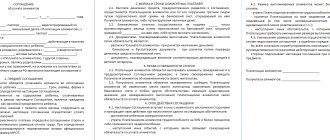Criminal liability and consequences of a conviction
Criminal liability for non-payment of alimony seems to many to be too harsh a measure, because it seems that this is not a crime, not theft or assault, but this is at first glance. Any violation of the law is considered an offense, especially if a citizen maliciously evades his duties and causes harm to other persons, especially minors.
But negligent fathers do not understand this, as well as the consequences that occur if they have a criminal record, even under the so-called “light” article. Thus, by virtue of Article 86 of the Criminal Code of the Russian Federation, a criminal record is considered expunged only after a year has passed from the date of entry into force of the conviction, and within 12 months a citizen has no right:
- obtain or renew a license to carry a weapon;
- occupy certain positions, especially leadership positions;
- apply for a visa to some countries, because they simply won’t accept him.
There is also a high probability that if a criminal offense has already been committed and the issue of imposing a preventive measure will be decided, arrest will be chosen and, moreover, the two terms may be combined, thereby increasing the stay in prison by at least six months.
Of course, after a year, a criminal record is considered expunged, but information about its presence in the databases of the Ministry of Internal Affairs is stored for a very long time, so such an unfavorable fact, even after 5 years, can entail the following consequences:
- the inability to get a job in any institution that belongs to the state, that is, municipalities and the civil service, the police, the Ministry of Emergency Situations, the fire department;
- ban on admission to some universities;
- the adoption of a child will be denied, as will the guardianship of, for example, a 14-year-old niece, but the cases are different;
- it will be impossible to find a job even as a coach, not to mention carrying out teaching activities in any organization related to the upbringing and education of children; the law has established a direct prohibition;
- it will be prohibited to be a member of various financial and counting commissions;
- Exit for permanent residence to some countries will be blocked forever.
Please note: If you have a criminal record, career prospects may be closed. And also a citizen will never be able to work in some industries, aviation, for example, cadastral and security. Moreover, many employers, under a plausible pretext, will not want to have such an unsympathetic employee on their team.
What is malicious evasion?
Malicious evasion of child support is a situation in which a parent systematically evades paying child support for a minor child for a long period of time.
To determine the case of non-payment of this amount of money to malicious persons, the following situations must occur:
- the parent is wanted because he does not pay child support;
- the parent does not disclose his real income;
- the parent abruptly changed his place of residence so that he could not be held accountable for failure to pay child support;
- the amount of alimony debt is too high;
- the parent refuses to get a job in order to be able to pay child support;
- the parent does not pay child support for more than 4 months;
- the parent refused to pay child support after the bailiffs' decision.
When does criminal liability arise for non-payment of alimony?
Many citizens are required to pay child support to children or elderly parents by court decision or agreement. But not all of them regularly fulfill their obligations. As statistics show, more than 2 million of the total number of draft dodgers, and this is approximately every fifth, behind which stands a child deprived of many benefits.
It is almost impossible to prove to a person that his minor relatives need financial support, but it is quite possible to force him to fulfill his duty through the measures defined by Federal Law No. 229 and a number of actions that bailiffs are authorized to do.
So, if there is a debt of just over 2 months, the bailiff has the right to apply the following measures to the alimony worker:
- issue a resolution banning travel outside the Russian Federation for citizens whose work activities involve business trips; such a measure may entail loss of work, not counting minor troubles in the first weeks;
- suspend the license to drive a vehicle, which for many fathers who have cars can be a very significant punishment, especially if they live far from their place of work;
- to foreclose, which is possible in the case of a significant debt on the debtor’s personal property, for example, to seize deposit accounts, write off up to 70% of wages, despite the small balance, and go home for a description and seizure of the property;
- draw up a protocol and submit it to the court to bring the citizen to administrative responsibility in accordance with Article 5.35.1 of the Code of Administrative Offenses of the Russian Federation, which may entail both the payment of a substantial fine and community service for the benefit of the city, not to mention arrest for 15 days .
For many, the above measures are more than effective, because once deprived of the opportunity to receive income just because of a minor offense, no one looks for problems again. But is it possible to bring criminal liability later if all measures have already been taken, but there is no result?
Read more about the procedure for imposing an administrative penalty in the article Administrative liability for evasion of alimony payments
How is debt accrued?
There are two ways to determine the amount of alimony to be paid:
- percentage of the parent's earnings;
- fixed amount.
If the amount of debt is calculated on the basis of a fixed amount, then this number must be multiplied by the number of months for which no payments were made.
If the amount is calculated based on a percentage of earnings, but the parent is not officially employed, then the amount of alimony payable is calculated based on the average monthly salary in the country for the period when the collection was carried out.
Also, the bailiff has the right to charge a penalty on such amounts.
Criminal penalties for non-payment of alimony
Pursuant to Article 157 of the Criminal Code of the Russian Federation, a person who evades the maintenance of minor children or elderly parents may be subject to the following types of punishment:
- correctional labor for up to 12 months;
- forced labor for a similar period;
- arrest for up to 3 months;
- imprisonment for up to 1 year.
The sanctions seem mild, but at first glance. And who knows what the reality of the punishments described is?
So, by virtue of Article 50 of the Criminal Code of the Russian Federation, correctional labor consists of forced labor for the benefit of the state. That is, the convicted person, if he has a permanent place of work, will work at his own enterprise, but he will transfer part of the salary, and this is up to 20%, to the state budget. Not a huge amount, but the consequences could be more detrimental.
After all, the court decision will be sent to the place of work for collection through the accounting department. Management, as well as other employees, learn about the conviction and the presence of criminal punishment. And how can the attitude of the collective change towards a person who refuses to support his children so maliciously that he is subjected to the harshest punishment? The loss of respect, business reputation, career growth, and possibly a permanent job under such circumstances is very great.
Within the framework of Article 53.1 of the Criminal Code of the Russian Federation, forced labor is attraction to work for the benefit of the city, but not at the main place of work. In each Subject of the Federation there are specialized correctional centers to which the convicted person is sent. Then, under the guidance of curators, he performs various types of work, mainly as an auxiliary worker.
That is, it can be painting public buildings, sweeping streets, glazing windows and many other types of physical labor that a man can do. You will need to work 6 days a week and all day with a short break for lunch and under strict supervision. But the payment, or rather part of it, will again have to be transferred to the state budget.
Note: If forced labor sanctions are imposed, permanent work can be said goodbye. But it will be difficult to find a new job in a year with a criminal record.
In pursuance of Article 54 of the Criminal Code of the Russian Federation, such a measure of punishment as arrest, of course, for only 3 months, can be applied to the convicted person, but... Who was in the Pre-trial Detention Center? Who knows what conditions are there for prisoners? What do they feed? What are you allowed to do? And what is the smell there? A mixture of tobacco, feces, sweat, grief and despair.
Walking is only allowed for 1 hour per day. The convict will be in the cell for 23 hours, and not alone, because such institutions are now overcrowded. It will be possible to receive parcels from relatives only a regulated number of times, and that’s if they allow it. There will be no visits either, a maximum visit from a lawyer is allowed. But is it needed already? There are also different categories of offenders in pre-trial detention centers, not just convicted persons, there are also suspects and accused.
And finally - imprisonment in accordance with Article 56 of the Criminal Code of the Russian Federation. A citizen, given a light charge, is sent to a general regime colony, but this is not such a big relief. Getting up and down on command, walking in formation, working on the territory of the colony and everything under escort, bars everywhere. And again, a strictly regulated number of visits to relatives and delivery of parcels, communication with cellmates, who may be different.
For a person who has never encountered the criminal punishment system, even a visit to such remote places will be a shock. But take, for example, relatives, what they will face. Permission to visit will need to be sought officially with the submission of a substantial package of documents, and the procedure for handing over the parcel will be similarly complex. And how is it formed?
Everything should be in transparent bags or jars, from coffee and pasta to meat and stewed meat. Many packages will be checked. If the ties are strong, they will simply break, and no one will collect everything that has scattered. Socks, sweaters and other items, only a regulated number of pairs. The same system applies to medications, only with a doctor’s prescription. And all this will be felt very carefully by a stranger.
Procedure for initiating criminal proceedings
Criminal prosecution is possible only after the bailiffs have used all debt collection measures in accordance with Federal Law No. 229 and finally brought the citizen to administrative responsibility. But the citizen did not repent, and therefore was brought to administrative responsibility again over the next 12 months.
Based on two protocols, the bailiff can send a presentation to the Department of Internal Affairs, or a statement of evasion of alimony can be submitted by the child’s legal representative.
| Application to initiate a criminal case for non-payment of alimony |
The document received by the police will be registered. Then, within 3 days, as part of the pre-investigation check, the investigator will send inquiries to the citizen’s place of residence and work and request a certificate about the existence of a debt, as well as about the measures taken by the FSSP.
Based on the collected evidence, a decision will be made to initiate a criminal case and the alimony provider will be summoned for questioning. Most of the information from the investigator has already been collected by that time, so standard questions will follow, and then the citizen will be recognized as the accused. Next, several procedural documents will be drawn up, and the case will be sent to the court to make a decision on the merits.
Consideration of the case in court
Signs of a criminal offense are based on certain signs, for example, premeditation of actions. Within the framework of Article 157 of the Criminal Code of the Russian Federation, there are no signs as such, but as judicial practice shows, when making a decision, courts take into account the following circumstances:
- how often did a citizen change his place of residence in order to evade visits from bailiffs;
- deliberately understated his earnings, for example, transferred to a low-paid position or quit his job;
- for what period payments were not received;
- total amount of debt;
- financial and marital status of the citizen;
- the presence of a search case initiated by the bailiffs if the debtor was hiding;
- the number of notifications about the existence of a debt and the need to repay it, indicating the consequences of criminal liability.
Given the significant number of factors that are taken into account, it is impossible to predict what punishment will be approved in the end, because each case is considered individually. After all, the accused may have not only mitigating circumstances, but also good reasons. Eg:
- loss of work due to the closure of the main enterprise in the city, especially if most of the residents worked there and there is no possibility of finding a job in another place without moving;
- the birth of children who also need support;
- an illness leading to disability and reduced income, and possibly deprivation of ability to work.
Bailiffs do not always thoroughly analyze every situation, since they are responsible for many cases that are simply impossible to approach individually. That is why a citizen must prove his innocence in court himself.
Moreover, a person who has already been convicted can appeal any court decision in the manner prescribed by law. Thus, an appeal against a court verdict in a criminal case is possible under Art. 389.4 Code of Criminal Procedure of the Russian Federation. After the verdict is passed, the convicted person is given 10 days to appeal the court decision. But it is necessary not only to draw up a complaint, but also to support it with documentary evidence that was not considered at the court hearing earlier.
Grounds for filing a claim
A citizen has every right to go to court and file a claim for alimony in several cases:
- If payments have not been received for more than four months;
- If a significant amount has accumulated in underpayments and debts, which the defaulter refuses to repay;
- The debtor refuses to follow the terms of a previously concluded agreement or a court decision made before this;
- The debtor is hiding and refuses to get in touch;
- The debtor hid his real income.
Info
In these cases, you can file a claim for alimony again, even if the court previously forced the citizen to pay it. All of them will lead to a re-examination of the case, a revision of the amount and the issuance of a ruling.
Questions and answers from a lawyer about criminal liability for non-payment of alimony
Is it possible to collect alimony from a person deprived of parental rights and bring him to criminal liability?
Deprivation of parental rights does not relieve one from the obligation to support children. For malicious evasion of alimony payments, they may be prosecuted.
Only adoptive parents in respect of whom the adoption decision has been canceled cannot be held criminally liable.
Can the plaintiff not be present at the hearing?
Maybe, if there are good reasons. To do this, it is necessary to send an application to the court to consider the case without the participation of the plaintiff, indicating good reasons and documentary evidence.
Is it possible for a persistent non-payer of alimony not to be held administratively liable, but immediately brought to criminal liability?
No. If there is a debt of more than two months, the bailiff has the right to take enforcement action. This is a conversation with the defaulter, a ban on traveling outside the Russian Federation, a ban on driving a vehicle, and bringing to administrative liability in accordance with Article 5.35.1 of the Code of Administrative Offenses of the Russian Federation. Only after all preventive measures have been taken, but there is no result, is it possible to bring criminal charges.
Is it possible to get a real sentence for failure to pay child support?
Yes. In case of malicious evasion of payment of alimony and correctional labor, the court may decide on imprisonment for up to a year.
How is the trial going?
In order to review your case, you will need:
- Make an application to the court;
- Take him to court;
- Take part in the conduct of the case (if necessary);
- Receive a writ of execution.
Let's start with the statement of claim. You can draw it up either yourself or with the help of a lawyer. However, you most likely will not need his services, since the appeal itself has a simple form and is written in three parts:
- Title. You will need to enter the details of the court (name and address), information on the plaintiff (applicant) and defendant (defaulter);
- Information part. With its help, you will need to describe the current situation, indicate the reason for filing the claim, and also determine the existing debt. In this case, each figure must be confirmed with a corresponding receipt. Also in the information part the requirements to the court themselves are indicated;
- Conclusion. Contains a list of all attached documents, such as transfer receipts, alimony payments agreement, court decision from a previous case, etc., the signature of the applicant and the date of filing the claim in court.
As soon as the application is ready and supported by the relevant papers, it will be possible to proceed to the trial itself. To start, you will need to contact the magistrate’s court at your place of residence or registration of the defaulter. By submitting a claim, you will begin proceedings, which have one significant feature - it can be carried out without the participation of the defendant. So if he doesn’t appear in court, he’s almost guaranteed to lose the case. itself takes about a month.
It is worth noting that the defendant has every chance of winning the case if he has a good reason. These reasons include:
- Difficult financial situation (the defaulter does not have a job, but is registered with the employment service);
- Serious illness of a relative or his death. Such an event may become the basis for a temporary deferment of payments;
- The defaulter is called up for military service;
- The defaulter is in prison for committing a crime.
And also in some other cases. By documenting such reasons, he can not only clear himself of the charges, but also challenge the court’s decision that has already been made.






